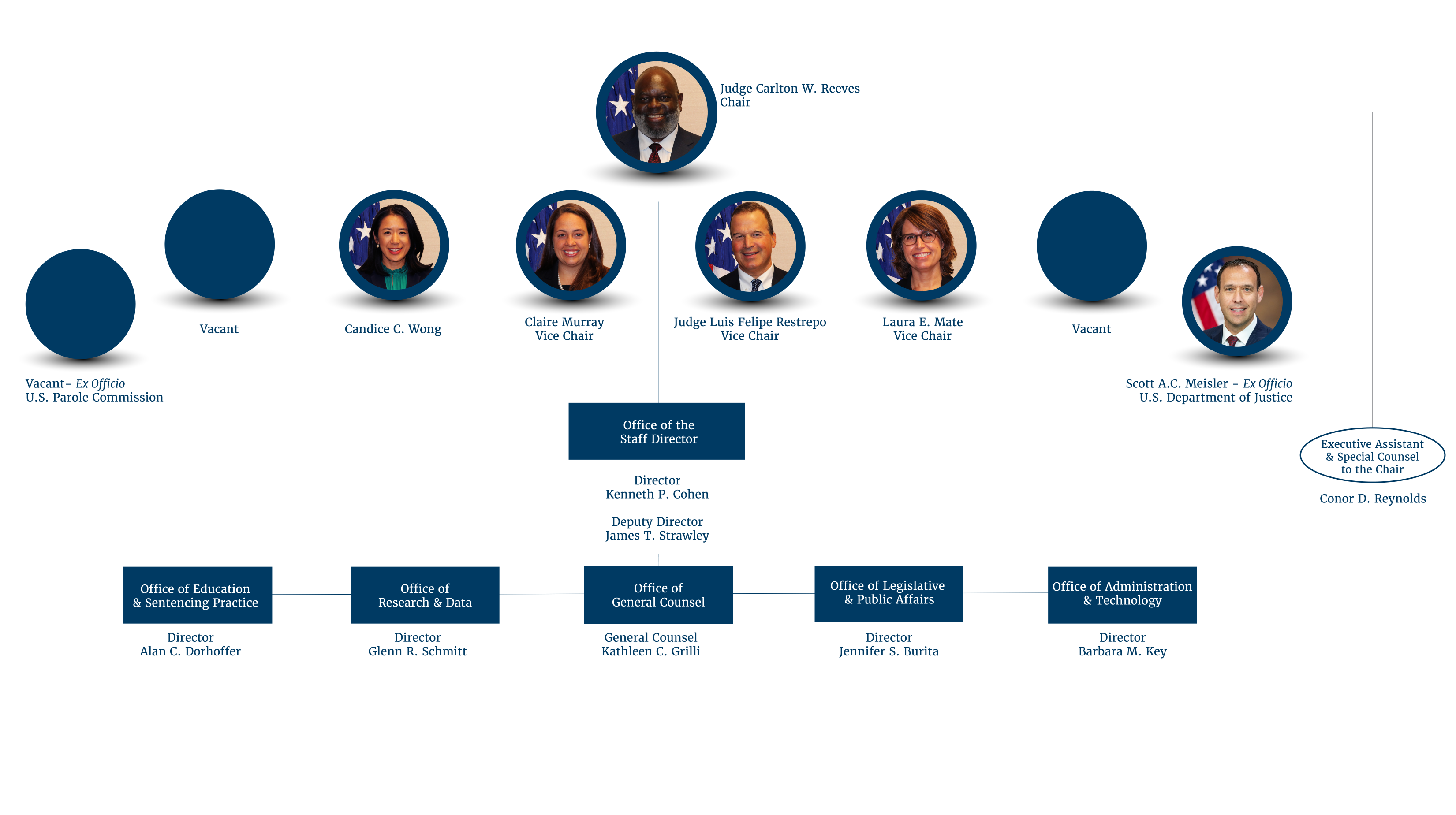Organization
The U.S. Sentencing Commission is an ongoing independent agency in the judicial branch created by Congress as part of the Sentencing Reform Act of 1984. The Commission's seven voting members are appointed by the President and confirmed by the Senate, and serve staggered six-year terms. No more than four members of the Commission can be members of the same political party, and at least three must be federal judges. The Attorney General, or the Attorney General’s designee, and the Chair of the U.S. Parole Commission serve as ex officio, nonvoting members of the Commission. The affirmative vote of at least four members of the Commission is required to promulgate amendments to the sentencing guidelines.
The Commission staff of approximately 100 employees is divided into five offices with the director of each office reporting to the staff director who in turn reports to the chair. The five offices are — General Counsel, Education and Sentencing Practice, Research and Data, Legislative and Public Affairs, and Administration and Technology. The staff director supervises and coordinates all agency functions.

Offices
Office of the Staff Director
The Office of the Staff Director supervises and coordinates all agency functions. The director of each office outlined above reports to the staff director, who in turn reports to the Commission chair.
Office of General Counsel
The Office of General Counsel supports the Commission on a variety of legal issues, including the formulation and application of the guidelines and guideline amendments, legislative proposals, and statutory interpretations. Legal staff monitor the district and circuit courts’ application and interpretation of the guidelines and advise commissioners about statutes affecting the Commission’s work. The legal staff also provides training support in conjunction with the Office of Education and Sentencing Practice.
In addition, the office performs all drafting services for the Commission, prepares the Guidelines Manual for printing, formally manages and maintains all papers and exhibits received by the Commission that constitute requests for Commission action on sentencing policy development, coordinates the Commission’s policy initiatives, and oversees the annual guideline amendment cycle, including providing notice to the public of proposed amendments and obtaining witnesses for public hearings.
Office of Education and Sentencing Practice
The Office of Education and Sentencing Practice performs the lead role in teaching guideline application to judges, probation officers, prosecuting and defense attorneys, and other criminal justice professionals. The staff develops training materials, participates in the sentencing guideline segments of training programs sponsored by other agencies, works in conjunction with the Administrative Office of the U.S. Courts and the Federal Judicial Center to create webcasts that are aired on the Commission’s website, and helps inform the Commission about current guideline application practices. The office also operates the “HelpLine” to respond to guideline application questions from guideline practitioners.
Office of Research and Data
The Office of Research and Data provides statistical and other social science research and analyses on specific sentencing issues and federal crime. The office receives documents from the federal courts concerning the sentences imposed, analyzes, and enters information from those documents into the Commission’s comprehensive computer database, and creates annual datafiles of sentencing information. Individual offender datafiles (without individual identifiers) from FY 2002 to the present are available on the Commission’s website. Working with the Office of the General Counsel, the Office of Research and Data also collects information on organizations convicted of crimes and on appeals filed in individual and organizational cases.
The office studies a variety of sentencing issues, including changes in the types and severity of federal crimes, demographic characteristics and criminal history of federal offenders, and sentencing trends. The office creates periodic reports on federal sentencing practices and tracks the application of the sentencing guidelines. These reports provide data concerning the types of crimes committed, the offenders who commit those crimes, and how courts sentence offenders and use the guidelines. The office also provides projections of the impact on the federal prison population of proposed legislation and proposed guideline amendments. The reports are distributed to the courts, Congress, the Executive Branch, and the public.
Office of Legislative and Public Affairs
The Office of Legislative and Public Affairs serves as the Commission’s liaison with Congress on sentencing matters, monitors Congress’s criminal law agenda and hearings, analyzes legislative proposals, and takes the lead role in responding to congressional inquiries, including specific requests for federal sentencing data. The office also provides services and information to other external entities, including the judiciary, Executive Branch agencies, academia, and advocacy groups. The office works closely with the Office of General Counsel on analyses of proposed and recently enacted legislation.
The office is also responsible for the agency’s public information functions, responding to inquiries and requests for information from the media, the public, Congress, academia, and government agencies. The office plays a primary role in coordinating the production, editing, printing, and dissemination of all Commission publications, including the Guidelines Manual, original research publications, and reports to Congress. The unit is also responsible for the Commission’s website and social media communications. The office coordinates the Commission’s public hearings and meetings.
Office of Administration and Technology
The Office of Administration and Technology provides general support to commissioners and staff regarding budget and finance, contracting, human resources, facilities, and a variety of other office activities and functions.
The office also comprises two units specializing in information technology and information systems, which provides the Commission the technological support necessary to operate its computer networks, remote capabilities, cybersecurity, website, records management, and its extensive information systems applications.
